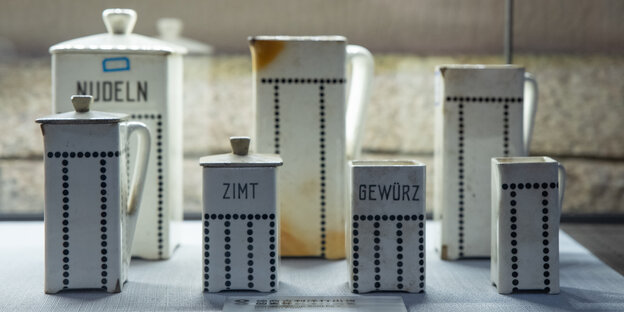An exhibition at the Municipal Museum covers everything from local history to the German colonial period in China. The trigger was a special discount.

The Qingdao Municipal Museum focuses on the German colonial period and sells porcelain vessels from a German company. Photo: Aurelien Foucault/dpa
Göttingen taz | The port city of Qingdao is located about 8,000 kilometers from Göttingen in the east of the People's Republic of China. It has ten million inhabitants, several universities and hosted the sailing competitions in the 2008 Summer Olympics. Both places are not twinned and have little resemblance to each other. However, it is possible to establish a link between the history of the city of Göttingen and German colonization in China, as demonstrated by the exhibition “Between Göttingen and 'Tsingtau'” in the Göttingen Municipal Museum.
At the end of the 19th century, Jiaozhou Bay in China was a rural settlement area and Qingdao was a small fishing village. On November 14, 1897, the German navy invaded and occupied the region. The Jiaozhou administration is now under the control of the Reichsmarineamt. This has big plans. With Qingdao as the center, a German model colony will be built. Other colonial powers should see and be amazed at what a German colonial administration is capable of. The capital, renamed by the Germans as Tsingtau, is divided into zones for settlers and the Chinese population.
During World War I, Jiaozhou came under the administration of the Japanese Empire in 1914. The German colonial era has left its mark on Qingdao to this day, including many mansions and one of the largest breweries in Asia.
German colonial power in China
Ewald Lehmann was 13 years old when his family moved to Göttingen in 1887. He graduated from high school there, abandoned military training, and studied law at the local university. In 1904 he traveled to Qingdao. There he becomes a judge, for both the German and Chinese populations, and holds this position for ten years.
In his free time he makes excursions by water and land, for example to the Lao Shan Mountains, a place of worship of religious Taoism. The German colonial power also built several buildings here, including an excursion cabin.
After the Japanese attack on Jiaozhou, Ewald Lehmann was taken prisoner. He was not released until 1920. Following his return to Germany, Göttingen remained his registered address, but Lehmann now travels a lot. He suffered tuberculosis and died in Davos in 1935.
From China, Ewald sent his father Ernst Lehmann letters, postcards, photographs and objects to Göttingen, which are now presented in the exhibition, including coins, brass bowls and silk embroidery. In one of his first letters from December 1904, Ewald reported on the first death sentence he imposed on the “famous and feared leader of a gang of thieves Kontan.” In general, the judge imposes drastic punishments, especially against the Chinese population; even petty thefts are punished with 50 lashes.
Chinese temples looted
Ernst's cousin Hans Wilde also works actively in the colony. In addition to letters and cards, he sends Göttingen a box with various “oddities.” These include items that Wilde claims were stolen during the looting of Chinese temples.
After a few months in China, Ewald Lehmann wrote home about his first death sentence.
Ernst Lehmann is a passionate defender of German colonial policy, a member of the German Colonial Society and the Pan-German Ethnic Association. In 1908 Kaiser Wilhelm II awarded him the South West Africa commemorative coin. In 1900, German troops passed through Göttingen on their way to the “Boxer War” in China. Ernst Lehmann organizes a reception for them at the train station and presents them with rolls, cigars and 200 liters of beer.
He later organized and preserved the correspondence and objects that his son and Hans Wilde sent to Göttingen. “Remnants of the collection and knowledge of Ewald Lehmann's work in 'Tsingtau' are preserved in the family to this day,” says Andrearechnerberg. Until a few weeks ago she was director of the museum and helped design the exhibition. “In 2023, the descendants of the fourth and fifth generations of the Lehmanns handed it over to the Municipal Museum.”
Exhibition “Between Göttingen and 'Tsingtau'”, Göttingen Municipal Museum, until June 9.
The documents and objects together formed a unique source on the history of the city of Göttingen in the Wilhelmine Empire and its connection with European colonial history.[https://museum.goettingen.de/ausstellungen/sonderausstellung/]
